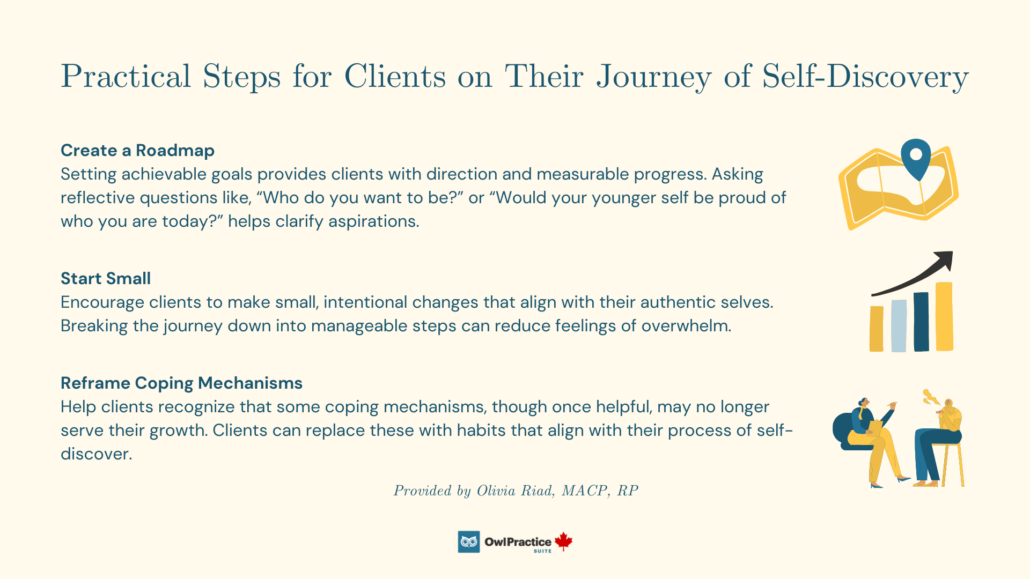Rediscovering one’s identity is a vital part of personal growth. For many clients, it represents the opportunity to reclaim their authentic self after experiencing challenges like life transitions, relationship struggles, or unresolved trauma. Losing a sense of identity can feel disorienting, impacting mental health, relationships, and personal goals. Professionals play a critical role in guiding clients through this transformative journey. By incorporating techniques like Inner Child Work, Internal Family Systems (IFS), and Emotionally Focused Therapy (EFT), alongside exploration of core values and purpose, therapists can help clients reconnect with themselves and build a meaningful life.

1. Understanding the Identity Crisis
An identity crisis often arises during major life changes, such as a break-up, relocation, job transition, or processing a loss. These events disrupt established routines and perceptions, prompting clients to question their life path, relationships, and sense of connection. For some, childhood trauma and unprocessed emotions create deeper layers of disconnection.
Losing a sense of purpose or sense of identity can manifest in feelings of anxiety, depression, or emotional numbness, affecting clients’ mental health and relationships. Understanding this intricate relationship between identity, life events, and personal growth is critical for effective support. Professionals can help clients reframe these crises as opportunities for rediscovery and healing.
2. Exploring the Motivations Behind Personal Growth
Rediscovering identity begins with uncovering the motivations driving the client’s personal development. This is essentially finding the why behind the client’s commitment towards a journey of rediscovery. Life transitions often act as catalysts that ignite motivation. For instance, a break-up may compel clients to reevaluate their values and redefine their future. Similarly, milestones like graduation, career changes, or losses can spark a desire for greater self-awareness and a deeper connection to their authentic self.
Therapists can guide clients to identify personal goals and aspects of life they wish to improve. By exploring their “why,” clients gain clarity on what matters most to them. This process of self-discovery becomes the foundation of their journey, helping them navigate challenges and sustain motivation for personal transformation.
3. Techniques for Processing Emotions and Healing Past Experiences
Rediscovering identity often involves processing unresolved emotions and addressing formative experiences. Techniques like Inner Child Work, IFS, and EFT can support this healing:
- Inner Child Work: Early childhood experiences shape our emotional landscape, values, and behaviors. Some patterns, driven by survival instincts, serve as coping mechanisms in the past but may no longer be helpful in adulthood. Inner child work offers a pathway for clients to understand these patterns, reconnect with their authentic selves, and embrace new, healthier ways of being.
- Internal Family Systems (IFS): Viewing the self as a system of parts allows clients to explore their inner world. Questions like, “What part of you feels hesitant to grow?” or “What part of you feels courageous and hopeful?” can help clients identify and engage with emotions tied to their past and build a stronger sense of self.
- Emotionally Focused Therapy (EFT): By focusing on attachment and emotional connection, EFT helps clients process emotions tied to past relationships. Clients can recognize patterns that inhibit connection and begin fostering healthier relationships with themselves and the supportive individuals in their lives.
Together, these techniques allow clients to reflect on their entire life: exploring their past, processing emotional pain, and healing attachment wounds, creating space for authentic growth.
4. Building a Supportive Framework for Rediscovery
Rediscovering identity requires a supportive environment where clients feel safe to explore vulnerable aspects of themselves.
- Professional Help: Therapists create a nonjudgmental space where clients can safely express fears, process emotions, and uncover valuable insights. By normalizing the complexities of this personal journey, professionals help make rediscovery feel approachable and empowering.
- Mindfulness Practices: Techniques like journaling, meditation, or grounding exercises help clients stay connected to their core values and cultivate self-awareness. This actively targets the sense of identity loss that clients feel during this transformative work.
- Supportive Relationships: Encouraging clients to build a network of trusted individuals fosters encouragement and accountability. A supportive relationship through a close friend can make a difference in building this framework. These connections reinforce any positive change clients make as they rediscover their identity.
A combination of individual therapy, supportive practices, and relationships creates a framework that empowers clients to move forward confidently.
5. Practical Steps for Clients on Their Journey of Self-Discovery
Therapists can offer clients practical strategies to make their rediscovery journey actionable:
- Create a Roadmap: Setting achievable goals provides clients with direction and measurable progress. Asking reflective questions like, “Who do you want to be?” or “Would your younger self be proud of who you are today?” helps clarify aspirations.
- Start Small: Encourage clients to make small, intentional changes that align with their authentic selves. Breaking the journey down into manageable steps can reduce feelings of overwhelm.
- Reframe Coping Mechanisms: Help clients recognize that some coping mechanisms, though once helpful, may no longer serve their growth. Clients can replace these with habits that align with their process of self-discover. For example, a coping mechanism such as avoiding emotions or problems can be replaced with gradual exposure — facing the difficult situation or emotion in small, manageable steps, using grounding techniques to remain emotionally regulated along the way.

6. Embracing the New Identity
The goal of rediscovering identity is not to create a new self but to reconnect with the true self. By aligning life choices with core values and cultivating authentic connections with family members and supportive individuals, clients can build a fulfilling life rooted in self-awareness and purpose.
Therapists can help clients maintain this alignment by encouraging reflection and offering tools for navigating setbacks. Emphasizing the value of purpose and connection ensures that rediscovery becomes a lifelong practice of authenticity and growth.
Conclusion
Rediscovering identity is a deeply personal yet profoundly transformative aspect of life. By uncovering motivations, processing emotions, and fostering self-awareness, clients can reconnect with their authentic selves and build meaningful lives. Professionals play a critical role in this journey, offering guidance, tools, and encouragement. Whether through Inner Child Work, IFS, EFT, or other supportive practices, therapists empower clients to embrace their true selves with confidence and purpose.

Book a free demo!
Reduce clinical administrative tasks and transform more lives with Owl Practice. Owl Practice provides all the tools you need to make your practice successful. Join the thousands of care professionals using Owl to run their practice every day.




